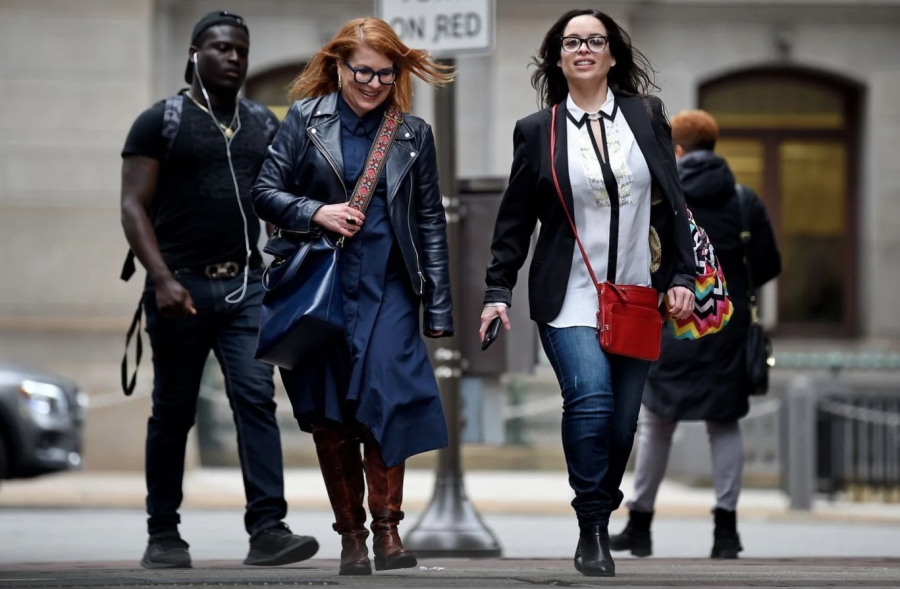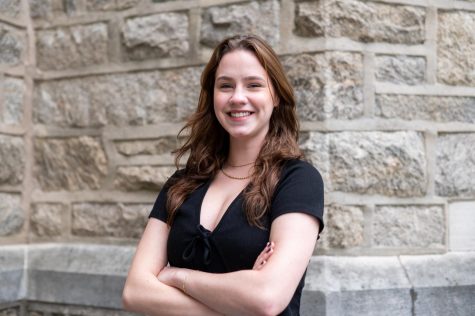Villanova Professor and Students Help Philadelphian Woman Get Released from Life Sentence
Courtesy of Tom Gralish and The Philadelphia Inquirer
Jill McCorkel and Cynthia Alvarado
April 9, 2020
Prior to the closure of courts for health precautions, Philadelphia woman Cynthia Alvarado was ordered for release after serving 11 years of a life sentence with the help of University professor Jill McCorkel and her students.
McCorkel, a professor of sociology and criminology, has conducted research since the 1990s involving the female prison population. Her research revealed the extended sentences women receive due to their minor involvement in a case. The cause of these inequitable sentences was found to be a lack of knowledge women had during the criminal-justice process.
“Often, the women won’t give information because they’re scared of the guy or in love, and then they end up getting hit with charges in a retaliatory fashion,” McCorkel said.
At the University, McCorkel is working with her students to correct the injustice women experience during their sentencing. The students focus on cases including a life sentence, and one by one they examine the circumstances of each case.
Alongside McCorkel, students select a handful of cases to assist the women involved with filing an application for commutation. If the application is approved, commutation reduces the punishment of a crime and replaces the original sentence with a lesser penalty. Commutation remains difficult to achieve, as only a dozen women in Pennsylvania have received a reduced sentence in the last 50 years. University students were able to add Alvarado into that statistic in March.
Alvarado fell victim to a Xanax addiction. In 2008, she drove her cousin Oscar to Fairhill Square Park with the intent to purchase drugs. As she waited in her car, Oscar decided to pull a gun on the drug dealer. As chaos ensued, Oscar shot into a crowd. Immediately following the shooting, Oscar ran to the car and Alvarado drove away from the scene. Later Alvarado discovered that a bystander in the crowd, Marta Martinez, was fatally wounded from a gunshot.
During the trial, a witness testified that Alvarado had advised Oscar to use the gun. The testimony resulted in Alvarado being charged with second-degree murder or participating in a felony that resulted in a death.
Jurors were hesitant to believe the testimony of the witness and asked on several occasions what an “accomplice liability” should be defined as. The main concern was whether urging Oscar to use the gun or driving him from the scene would factor into the conviction. The judge explained that both actions should be considered. Both Alvarado and Oscar were given a life sentence without the chance for parole.
Last year, the case returned to trial. After further review, the federal court overturned the verdict and offered Alvarado a plea deal. The District Attorney’s Office offered her 11 to 22 years in prison if she plead guilty to third-degree murder.
McCorkel and her husband, Brad Mellinger, who was the juror inquiring about the definition of accomplice liability, wrote letters to Alvarado. McCorkel’s husband learned from his wife that Alvarado had been sentenced to life.
“I was convinced that she was not guilty of conspiracy,” Mellinger said. “The only way I was willing to consider her guilty via accomplice liability was if her assistance to her co-defendant after the shooting, in and of itself, would qualify.”
McCorkel centered her letter around her research and that of her students. The research brought the credibility of the witnesses to question. By walking through the decade-old crime scene, students examined the plausibility that witnesses could see Alvarado given the terrain. It was also revealed that the key witness who testified of Alvarado’s command for Oscar to use the gun was interviewed by an officer who was terminated for tampering with evidence. More so, the witness received a deal for probation on her own criminal charges in exchange for her testimony in the case.
On March 11, Alvarado pleaded guilty to murder and robbery. By pleading guilty, Alvarado was offered immediate release from prison. The following day she returned home.
Alvarado met with McCorkel and admitted that she had thrown out the first letter she received from her. “I thought it was someone just trying to ride the wave of mass incarceration,” Alvarado said.
In McCorkel’s second letter, Alvarado was made aware of the students’ research and the connection of McCorkel’s husband to the trial.
“I was crying, it was surreal,” Alvarado said. “After that, it just seemed like amazing things started happening, with everything her and her students were able to obtain.”
When Alvarado was sentenced, the students, alongside McCorkel, supported her family in the courtroom. Susan Lin, Alvarado’s lawyer, commended the students for not only the research they conducted but their emotional support as well.
“It made a difference that she had a community of people to come back to,” Lin said.



